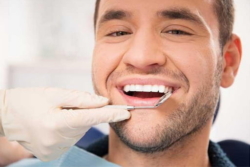
Dentures are prosthetics of the oral cavity, fitted to replace one or several missing teeth. They’re typically removable and made of acrylic, nylon, and metal. Some are attached with bonding or by clasping onto adjacent teeth or dental implants. The type selected for your needs will influence how and what you can eat with ease. If you want to try it or if you have any questions, set up an appointment at Aura Family Dentist for in-depth advice and consultation.
Different types of Dentures
Complete Dentures replace all of the patient’s teeth and reside on top of the gums. They are conventional or immediate:
Conventional dentures are permanent dentures made to fit the gums with precise accuracy in about eight to 12 weeks after the teeth have been removed.
Immediate dentures are positioned as soon as the teeth are removed and are a temporary solution until the gums heal and shrink and conventional dentures can be crafted and inserted.
A partial denture is a removable piece or bridge used to replace one or more missing teeth while preventing others from shifting position. Typically attached to a pink or gum-colored plastic base, they are connected by a metal framework that holds the acrylic denture in place. These require the patient to still have some of their natural teeth to attach to.
Transitional partial dentures are the most cost-effective type of denture and look the least natural. They are generic and won’t fit securely or comfortably. An adhesive is needed to procure a bond.
Implant-supported dentures use permanent anchors to stay securely in place, typically when a patient has few or no, but still enough bone to support an implant.
Eating With Dentures Advice
New dentures may feel a little odd or loose in the beginning. You should expect some soreness and tenderness. Increased saliva flow might take getting used to.
Eating with dentures (even eating with partial dentures) for the first time will be uncomfortable, and Adjusting might take weeks. If discomfort persists for longer, please see your dentist for possible necessary modifications.
The stigma around false teeth makes many people too embarrassed to seek help in learning how to smile, talk, and eat again. But dentures are common, and help is readily available. When you’re ready to journey into a normal diet, you should:
Start Slowly
For just the first few days, try to chew properly. It might be quite uncomfortable while your gums are still sensitive, so give yourself time to get used to the changes. Most tend to chew on one side more than the other without realizing but this could make dentures slip. Distribute your food slowly and evenly.
Start With Soft Foods
If you have traditional dentures, they may place some pressure on your gums and jaw, which can cause discomfort as you begin to eat. Slight changes to your regimen will help you adjust. Expect some soreness and turn to a mechanical soft diet.
Prosthetics may become destabilized if you bite with your front teeth. Cut or chop your foods into small pieces and chew with your sturdier back teeth. Definitely stick to blended, pureed, ground, mashed or liquid foods, easy to chew and swallow to receive adequate nutrition.
Foods that are gentle on dentures:
- Eggs
- Yogurt
- Soft cheese
- Poached, broiled, or stewed meat, fish, and poultry
- Tuna or egg salads
- Shaved deli meat
- Applesauce
- Cooked, soft, or skinless fruit like bananas and melon
- Oatmeal
- Soft bread, pancakes, muffins, or rolls
- Potatoes, pasta, and rice
- Beans
- Soup
- Smoothies, milkshakes, ice cream or popsicles
- Grits
- Tofu
Eating Limitations
Traditional dentures can restore your ability to eat many foods but remember that they aren’t real teeth. Take precautions to encourage healing and prevent damage and irritation. Hard and sticky foods can harm fragile dentures and become trapped between spaces in your gums, making them likely to develop irritation and infection.
Avoid spicy foods in the early stages, which can sting. Feel free to enjoy everything, but make sure to wash your dentures and mouth thoroughly afterward. Eating with partial or removable dentures can be more restricting than a permanent set anchored into place. Confirm with your dentist for recommendations based on your particular circumstance.
Foods to avoid or eat with caution:
- Corn on the cob
- Sticky candy; chewing gum, taffy, marshmallow, and caramel
- Raisins and berries
- Crackers
- Crunchy or fleshy fruit
- Peanut butter
- Crusted toast, hard bread, or bagels
- Popcorn
- Raw vegetables
- Steak, tough or stringy meats
- Whole nuts
Unlike natural teeth, dentures have no nerve endings to sense warmth. The insulation makes it challenging to know how hot food is. So, test the temperatures on your lips. Be careful with hot liquids. Give heated drinks a tiny sip to make sure it’s safe to consume. Look for visual cues like steam to prevent scalding or burning of the mouth.
Drink with your meals to make food easier to chew and swallow, but don’t hold liquids in your mouth to avoid soaking and loosening the dentures.
Choose a Good Adhesive
The choice of denture adhesive is important. The glue provides a lock for partial dentures while eating but can make cleaning difficult. There are also seals and powders that offer less stability but are easier to freshen and allow for less tissue irritation. The chemicals found in different brands and formulas could also affect the taste of foods.
Dentures Can Alter Taste
With new dentures, familiar foods might suddenly taste different. Traditional types for the upper arch can sometimes cover the portion of your palate containing taste buds, resulting in some foods losing smell and flavor. This sometimes triggers changes in appetite and results in overindulgence in sweet or salty foods to satisfy cravings.
Also, keep in mind that failure to properly clean your dentures might cause an accumulation of bacteria, bringing about foul or unpleasant tastes. Keeping your dentures sanitary, and your senses should return over time. Clear any food stuck in your dentures to prevent malodor. Make sure to practice pristine habits, like flossing, brushing, and rinsing after every meal.
Healing and Returning to Normal Foods
Eating with dentures for the first time will be strange. Actually, it will take several weeks to acclimate to new dentures as your facial muscles adapt to changes in the positioning of your tongue, lips, and cheeks. During that time, be attentive about what and how you eat. There may be some foods that will always be difficult to consume, but once you are fully accustomed to wearing dentures, you should be able to enjoy almost anything. With patience and practice, it will become easier to eat, and you will grow more confident to dig into your old favorites again.






